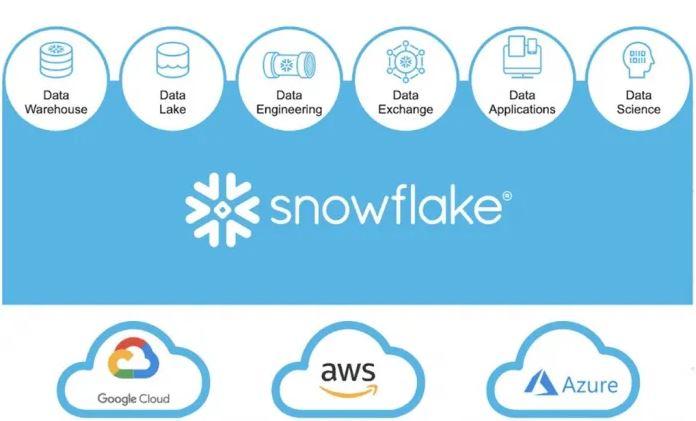Maximizing Data Efficiency with the Snowflake Cloud Data Platform

A faster world of data-driven decision-making requires speed to the core. Businesses need platforms that not only manage huge amounts of data but also make it easier to operate and provide actionable insights. Snowflake Cloud Data Platform has answered all these queries with a flexible and scalable environment for modern warehousing and analytics.
We explore within this blog the key features of the Snowflake platform, how it's really disrupting the data warehousing space, and why businesses in every industry are putting it into their cloud strategy.
Introduction: The Rise of the Snowflake Cloud Data Platform
Along with the explosion of big data and the increasing dependency on cloud infra, the task of managing, analyzing, and securing their own data becomes a huge challenge for organizations. It has to be scalable and cost-effective, too. That's when Snowflake Cloud Data Platform comes into the picture as a leading solution.
Snowflake's cloud-native architecture supports the organization in storing, analyzing, and sharing massive volumes of structured as well as semi-structured data. In addition, unlike traditional data solutions, it runs natively on a multiconfigured environment of cloud instances, hence making the businesses avail the power without being locked to a single vendor.
Key Features of the Snowflake Cloud Data Platform
Snowflake provides various capabilities to help enterprises in streamlining their data operations. Some of Snowflake's most identified features are as follows:
- Scalability: Since Snowflake dynamically allows users to scale up or down the data operations, organizations pay only for the consumed resources.
- Multi-cloud capability: Snowflake is a cloud-based platform that operates on AWS, Google Cloud, and Microsoft Azure; hence, it allows flexibility to businesses through cloud strategy.
- Strong Data Sharing Securely: One of the major strongholds of Snowflake is that it allows data sharing securely within and between organizations without having to transfer or duplicate data at all.
- Decoupling of Compute and Storage: Snowflake decouples storage from compute. It allows companies to scale either, which further enhances cost efficiency.
In respect to the needs of different businesses looking for some level of adaptation and safe management of data, Snowflake becomes an ideal platform.
How Snowflake Transforms Data Warehousing
Data warehousing has been part of enterprise data management for a long time, but legacy systems have failed to keep pace with modern business needs. The product that is the essence of cloud computing is Snowflake-a data warehousing solution that offers improved performance with lower overhead cost.
With Snowflake, you don't have to worry about manually managing your hardware but can get on with handling your data warehousing needs. As a result, the elastic compute engine provided by it allows one to scale up or down processing power according to a specific level of need, whereas in traditional data warehouses bottlenecks plague them.
With automatic optimization and data compression at Snowflake, even large data sets are processed quickly, unlocking business insights sooner and at lower costs.
Integrating Snowflake with Other Cloud Services
One of the most important strengths is that Snowflake is simply easy to integrate with other cloud platforms. Whether you're an AWS, Google Cloud, or Azure organization, Snowflake's architecture is built in a very fluid way and integrates very easily with the cloud infrastructures already existing within your business.
Snowflake is pre-built with integrations to a vast majority of third-party tools and services, including ETL pipelines, business intelligence platforms, and data visualization tools. This interoperability allows organizations to centralize their data operations while using their preferred tech stack, thereby improving productivity while reducing complexity in dealing with multiple systems.
Real-World Use Cases: Snowflake in Action
From restaurants to sportswear manufacturers, a whole host of industries and businesses are using Snowflake to solve complex data problems and deliver innovation. Here are just a few examples:
- Retail: A major retail company is using Snowflake to grasp the real-time purchase behavior of its customers. Therefore, it would be able to improve the inventory and personalise marketing campaigns more effectively.
- Financial Services: With the help of Snowflake's secure data-sharing features, financial institutions can collaborate with partners, carry out a risk analysis, and meet the regulatory requirements all this without having to compromise the integrity of the data.
- Healthcare: Snowflake enables health care providers to bring together data sourced from various places regarding the patient to help them make more informed, data-driven decisions that lead to better outcomes.
These use cases further highlight the point that Snowflake can be enabled to meet the specific need of an industry, thus keeping the organization responsive to a data-centric world.
Conclusion: Why Choose Snowflake for Your Data Needs
Selecting the appropriate platform to manage and analyze your data is of paramount importance in an era that considers this one among the greatest assets any business can enjoy. Snowflake Cloud Data Platform appears as versatile, secure, and scalable software that allows clients to streamline data operations by cutting costs.
Whether the focus be on building stronger data warehousing capabilities, integration into existing cloud services, or deeper exploration of advanced analytics opportunities, Snowflake provides tools and infrastructure for you to make a transformation in your approach to data. As a result of using Snowflake, businesses will be capable of staying ahead of the game, future-proofing operations, and unlocking the real potential in their data.
Post Your Ad Here

Comments